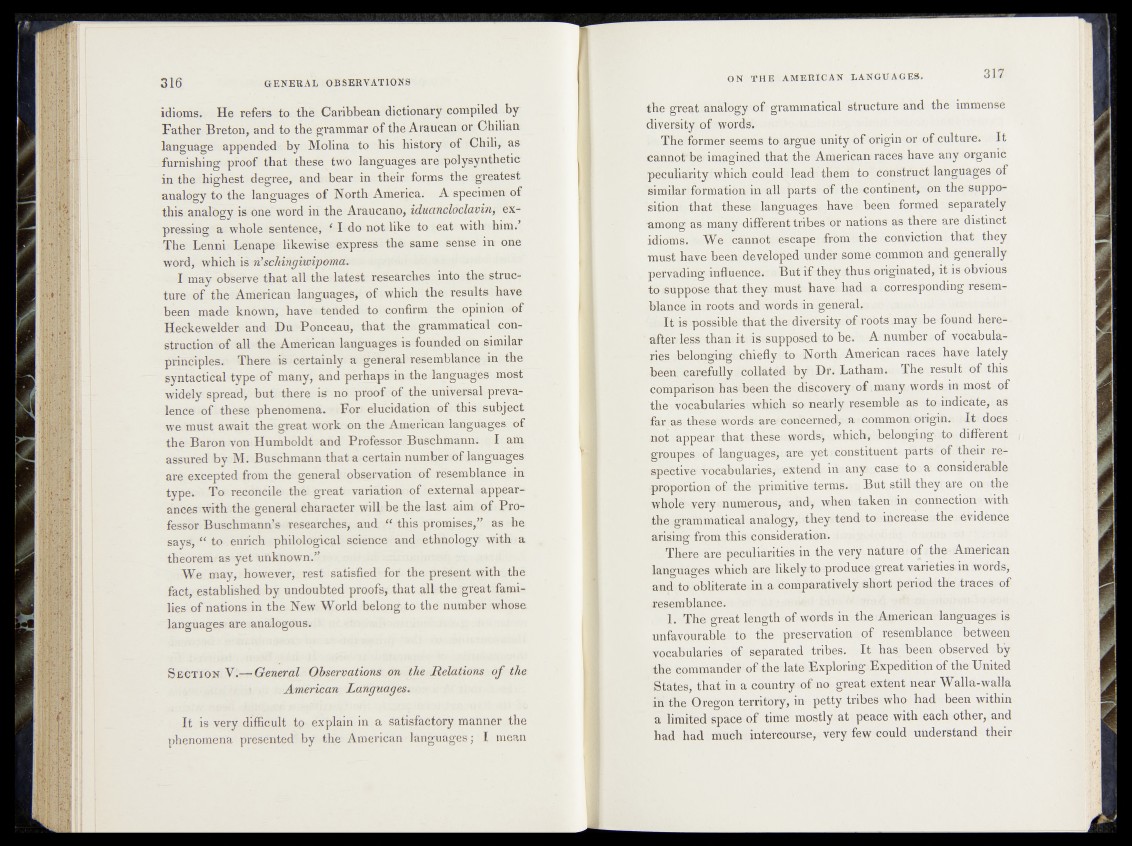
idioms* He refers to the Caribbean dictionary compiled by
Father Breton, and to the grammar of the Araucan or Chilian
language appended by Molina to his history of Chili, as
furnishing proof that these two languages are polysynthetic
in the highest degree, and bear in their forms the greatest
analogy to the languages of North- America. A specimen of
this analogy ia-one" word in the Araucano, iduancloclavin, expressing
a whole sentence, fT do not like to eat with him.
The Lenni Lenape likewise express the same sense in one
word, which is n’schingiwipoma.
I may observe that all the latest researches into the structure
of the American languages, of which the results have
been made known, have tended to confirm the opinion of
Heckewelder and Du Ponceau, that the grammatical construction
of all the American languages is founded son similar
principles. There is certainly a general resemblance , in the
syntactical type of many, and perhaps in the languages most
widely spread, but there is no proof of the universal prevalence
of these phenomena. For elucidation of this subject
we must await the great work on the American languages,,.of
the Baron von Humboldt and Professor •Busehmann*. I am:
assured by M. Buschmann that a certain number of languages
are excepted from the general observation of resemblance in
type* To reconcile the- great variation of external appearances
with the general character will be the last. ,aimJib£>Professor
Buschmann’s researches^ and “ this promises,” as he
says, “ to enrich philological science and ethnology with a
theorem as yet unknown.”
We may, however, rest satisfied for the present with the
fact, established by undoubted proofs, that all the “great families
of nations in the New World belong to the number whose
languages are analogous.
S ection Vi— General Observations on the Relations o f the
American Languages.
It is very difficult to explain in a satisfactory manner the
phenomena presented by the American languages; I mean
the great analogy of grammatical structure and the immense
diversity of words-.
| The former seems to argue unity of origin or of culture. It
cannot*be imagined that the American races have any organic
peeuliaritylwhioh could lead them, to construct languages of
similar formation in all parts of the continent, on the supposition
that: these.! languages, have been formed separately
“among as many different tribes 'or nations as there are distinct
idioms. We cannot escape .-from! the conviotion that they
must have been developed under some common and generally
pervading infiuenceixc But if'they thus originatedj it is. obvious
toi&uppose that they must have: had a corresponding resemblance
in roots and words in general..
11 is possible that the: diversity of rootshnay be found here- -
after less than k is supposed to be. A number o f vocabularies
belonginguchiefly to: > North American traces have lately
been carefully collated by Dr. Latham. The result of this
comparison has: been the discovery« of.manyiwords in most of
the vocabularies? which so nearly resemble as tovindieate, as
•far as these words are concerned^i a ? common* origin. It does
not appear that these words-, which .^belonging? to different
group.es- - ofitlanguageSj. are:y©tmi®istttuent'^rti^ df'theii-i res-
speed vevocabularies., extend in any case to a considerable
proportion of the primitive termss i But still-ithey are on the
whole very numerous,, and; when taken in • connection with
the grammatical analogy, they tend to increase the evidence
arising from this consideration, p
There are peculiarities in the very nature of the American
languages which are likely to produce.» great varieties in words,
and to obliterate in aibopipaB^ti^y short period the traces «of
resemblance.
1. The great length of words in the American languages is
unfavourable to the preservation, of resemblance between
vocabularies of separated tribes. It has been observed by
the comm anderhof the- late Exploring Expedition of the United
States, that in a country of no great- extent near Walla-walla
in the Oregon territory, in petty tribes who had been within
a limited space of time mostly at peace with each other, and
had had much intereourse, very few could understand their